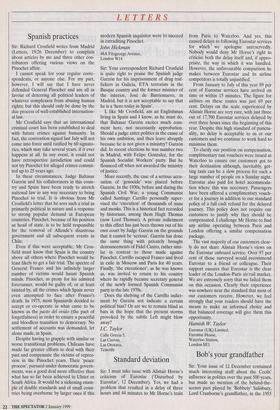LETTERS Spanish practices
Sir: Richard Crosfield writes from Madrid (Letters, 19/26 December) to complain about articles by me and three other con- tributors offering various views on the Pinochet affair.
I cannot speak for your regular corre- spondents, or anyone else. For my part, however, I will say that I have never defended General Pinochet and am all in favour of deterring all political leaders of whatever complexion from abusing human rights; but this should only be done by the due process of well-established internation- al law.
Mr Crosfield says that an international criminal court has been established to deal with future crimes against humanity. In fact, the convention signed last July will not come into force until ratified by 60 signato- ries, which may take several years, if it ever happens at all. In any event, it could not have retrospective jurisdiction and could not try Pinochet for alleged crimes commit- ted up to 25 years ago.
In these circumstances, Judge Baltasar Garzon and his collaborators in this coun- try and Spain have been ready to stretch national law in any way necessary to bring Pinochet to trial. It is obvious from Mr Crosfield's letter that he sees such a trial as primarily political in nature and a response to strong popular demand in. European countries. Pinochet, because of his position as head of state, is to be held responsible for the removal of Allende's disastrous government and all subsequent events in Chile.
Even if this were acceptable, Mr Cros- field must know that Spain is the country above all others where Pinochet would be least likely to get a fair trial. The spectre of General Franco and his infinitely larger number of victims would haunt Spanish minds. Pinochet, as proxy for his admired forerunner, would be guilty of, or at least tainted by, all the crimes which Spain never even attempted to face after Franco's death. In 1975, most Spaniards decided to accept or co-operate in what came to be known as the pacto del ovido (the pact of forgetfulness) in order to ensure a peaceful and bloodless transition to democracy. No settlement of accounts was demanded, let alone made, in Spain.
Despite having to grapple with similar or worse transitional problems, Chileans have made far greater efforts to deal with their past and compensate the victims of repres- sion in the Pinochet years. Their 'peace process', pursued under democratic govern- ments, was a good deal more effective than what has so far been achieved in Ulster or South Africa. It would be a sickening exam- ple of double standards and of small coun- tries being overborne by larger ones if this modem Spanish inquisitor were to succeed in extraditing Pinochet.
John Hickman 48A Fitzgeorge Avenue, London W14


























































 Previous page
Previous page